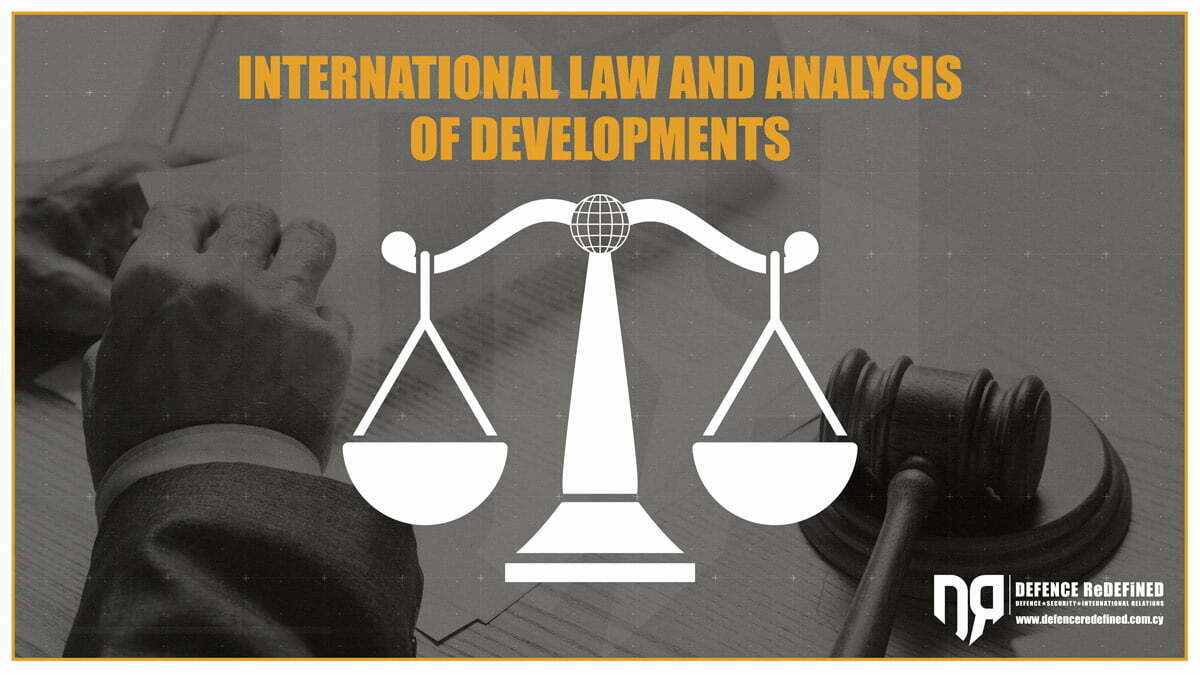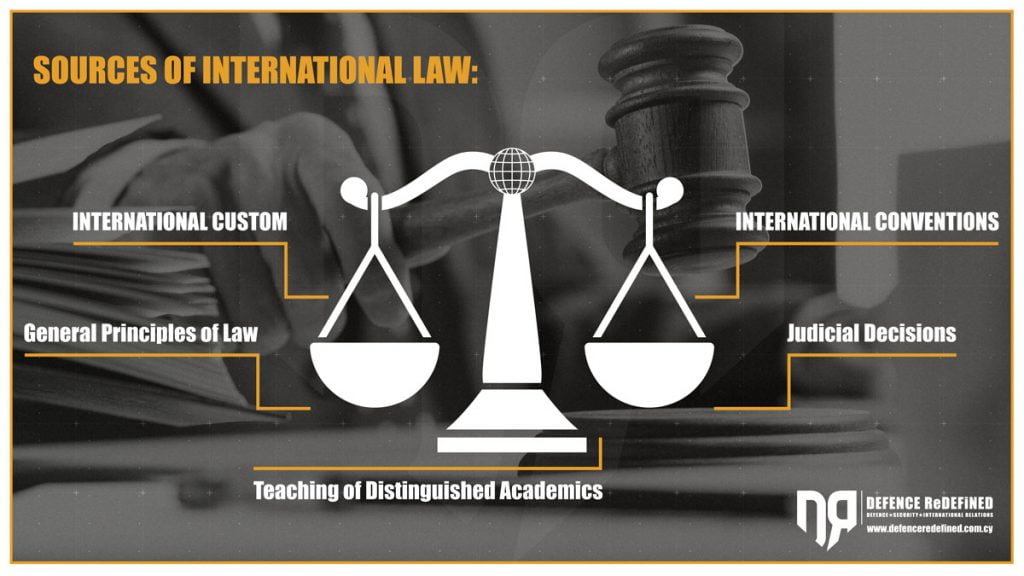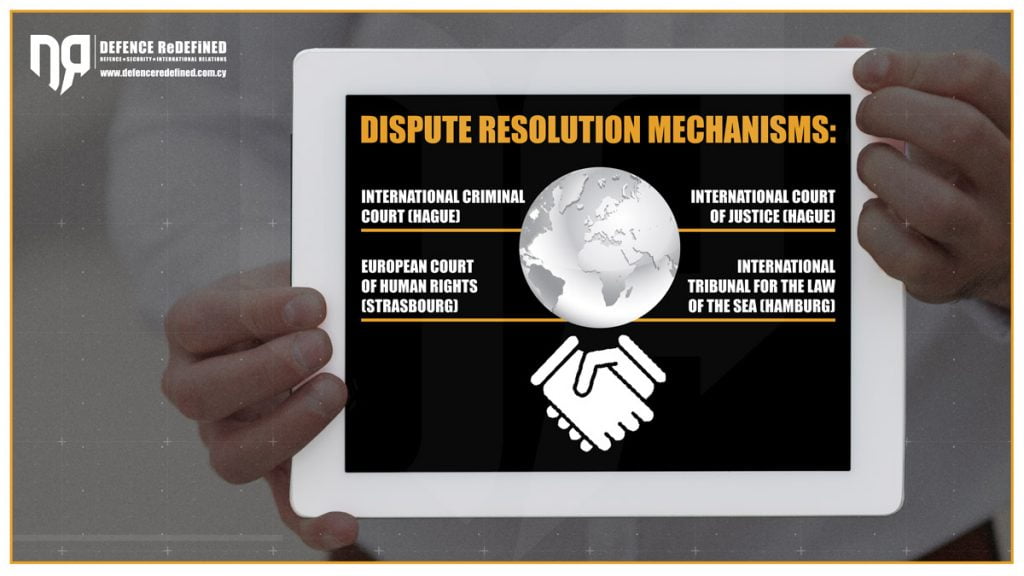OPINIONS
OPINIONS
*Nicholas Ioannides (PhD)

It is quite common in public discourse to use the term “international law”. However, usually those using it do not know what this branch of law actually is about. In short, international law is the set of rules governing the relations and conduct of certain entities, especially states, in the international legal sphere. Given that it is a branch of legal science, it is indispensable to have a legal background in order for a person to understand and interpret it.
Also read: International law cannot be à la carte for Turkey
In addition, as we shall see below, knowledge of general international law is essential in order to grasp how the relevant rules in each of its specialised areas apply. This article is a brief introduction to the topic of international law in order for the reader to be in a position to understand better future articles in which the terms explained below will be utilised.

Due to the lack of a supranational legislature, the rules of international law stem from specific sources listed in Article 38§1 of the Statute of the International Court of Justice (Hague). These sources are: international conventions, international custom, general principles of law, judicial decisions and the teaching of distinguished academics. Although there is no formal hierarchy, it is accepted that the main sources are international conventions and international custom. Furthermore, in international law there are additional acts from which rules derive, such as the UN Security Council resolutions, unilateral declarations by states etc.
It should be stated that the terms ‘participants’ or ‘users’ of international law are also used regarding the subjects of international law, that is, entities which acquire rights and for which obligations arise. For a long time, the state was the sole subject of international law. However, over time it has been accepted that international organisations, the individual, national liberation movements and non-governmental organisations can also have rights and obligations. In an increasingly interdependent international community, all of the above entities play an important role; this resulted in the limitation of the powers for an “almighty” state.

It is important for a legal order to have dispute resolution mechanisms. However, in order for an inter-state dispute to be brought before a dispute settlement organ it is necessary for states to have provided their consent beforehand. This condition derives from state sovereignty and sovereign equality of states, which implies that, in principle, no state can impose its will on another (par in parem non habet imperium).
The main international judicial organ is the International Court of Justice (Hague), which is the UN judicial organ. The Court of Justice adjudicates disputes only between states and delivers advisory opinions to the UN bodies. The judgments of the Court are binding only on the parties involved in each case (the concept of stare decisis does not apply here).
Also read: Kosovo | President Hashim Thaci is accused of war crimes | VIDEO
Moreover, the International Criminal Court adjudicates cases concerning only individuals and has jurisdiction in respect of the following international crimes: genocide, aggression, crimes against humanity, war crimes. In addition, the International Tribunal for the Law of the Sea deals with disputes concerning the interpretation and application of the 1982 UN Convention on the Law of the Sea. Regional courts such as the European Court of Human Rights and the Inter-American Court of Human Rights have been established for the protection of human rights. States also have the option to set up ad hoc arbitration tribunals and select arbitrators, if they do not wish to have recourse to standing international courts. Regional organisations such as the European Union have their own judicial bodies (Court of Justice of the European Union).
Finally, international law also includes more specific rules applicable to its specialised areas, such as the rules on the use of force (ius ad bellum), international humanitarian law (ius in bello), international criminal law, law of the sea (an article will be published soon), and human rights law. As mentioned earlier, a basic requirement for understanding, interpreting and applying the rules governing the aforementioned areas is good knowledge of the legal framework of general international law (sources, subjects, function of courts).
*Public International Law expert (University of Bristol)
Also read:
NEWSLETTER SUBSCRIPTION
A reluctant alliance? A different approach to French – Serbian defence relations
It has only been a few months since Croatia started receiving the first of the Rafale fighter jets it ordered from France.
The role of SERIOUS GAMES in the development of skills on Defense Standards
In an increasingly complex world, one vital factor for any successful organization is continuous capability building.
Strategy for Building Up Interoperable Defence Capabilities
Based on the current and emerging security threats and challenges in the geostrategic landscape, there is a…
STORE project | AI-assisted optronics to increase combat perception capabilities
The European Commission signed the Grant Agreement for the launch of the STORE (Shared daTabase for Optronics image Recognition and…
The FEDERATES project | Developing Europe’s first MSaas ecosystem
On 21 March 2024, the first Italian Workshop on the FEDERATES project of the European Defence Fund was held.
Cyprus | Jordan mission to reinforce aerial firefighting means
Two firefighting helicopters with their 18-member crew arrived in Cyprus from Jordan to support the Republic of Cyprus’ aerial firefighting.
Saint George | The Patron Saint of the Army and the Infantry
Saint George is one of the most prominent Saints of the Christian religion, not only of the Eastern Orthodox Church, but also of all…
QinetiQ | UK’s first Manned – Unmanned aircraft Teaming
QinetiQ has successfully trialled the UK’s first Manned-Unmanned Teaming (MUM-T) demonstration between a crewed aircraft and a drone.
Lambda Automata | Investment in UAV technology
Greek Lambda Automata has recently announced a major development that will strengthen its position in the defence industry.



















0 Comments